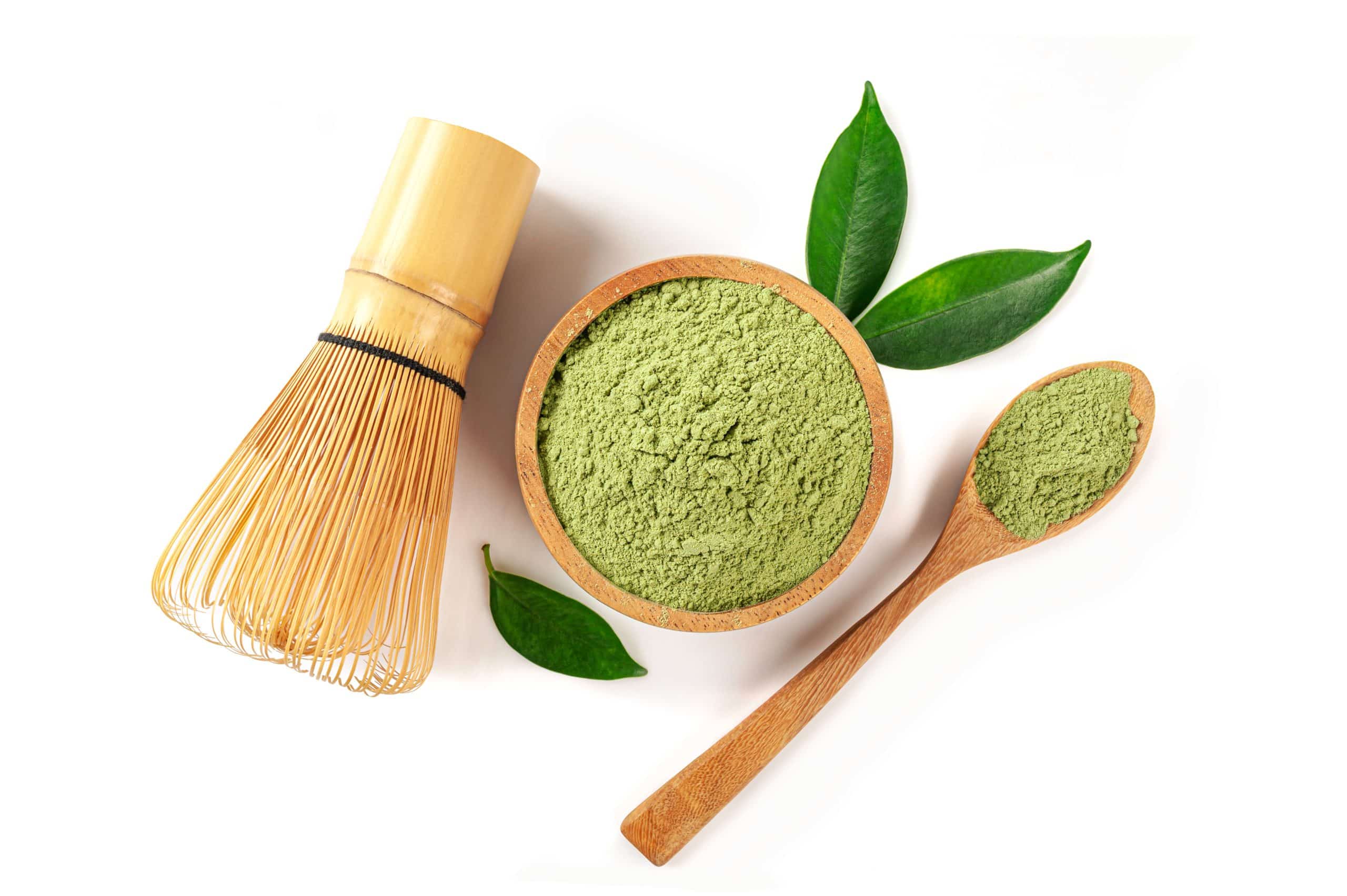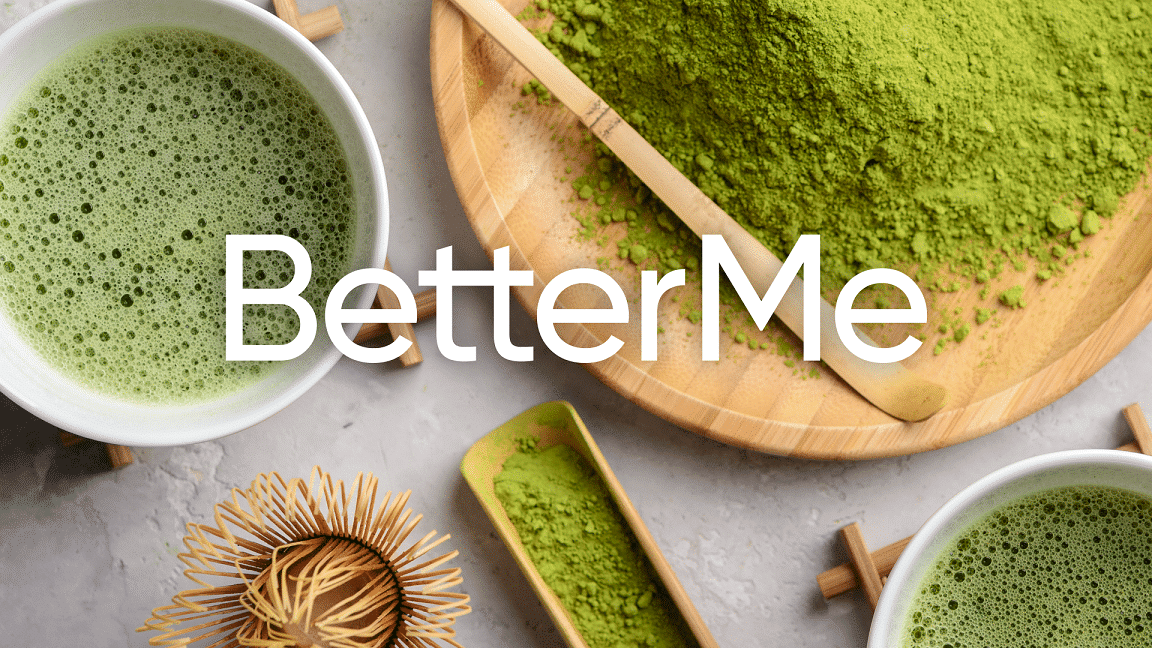Green, earthy, and rich with the unique depth of umami, Matcha may just be the perfect start or boost to your day. This finely ground powder of specially grown and processed green tea leaves has surged in popularity worldwide, not just for its possible health benefits but also for its distinctive flavor.
But as you’re reaching for a cup of Matcha, whether to kickstart your morning or as an afternoon pick-me-up, to keep you alert and focused, you may wonder about its caffeine content. Here’s what we know: Matcha does indeed contain caffeine, but exactly how much varies (5).
Can Matcha Keep You Awake?
Yes; matcha can keep you awake because it contains caffeine.
Caffeine, a natural stimulant most commonly found in tea, coffee, and cacao plants, works by stimulating the brain and central nervous system, helping you stay alert and preventing the onset of tiredness (10).
The caffeine content in matcha is notably higher than that of regular green tea, due to its unique preparation and consumption method. Since Matcha involves ingesting the whole tea leaf in powdered form, you’re getting a more concentrated dose of caffeine.
Interestingly, the way Matcha affects the body may differ from the caffeine hit you’d get from a cup of coffee. Matcha, green and black teas also contain a natural substance called L-theanine, which promotes relaxation without drowsiness (4).
That means the L-theanine in Matcha might counteract some of the negative side effects of the caffeine, potentially providing an energy boost without the jitteriness or crash often associated with coffee (12).
There are numerous benefits which may be tied to moderate caffeine consumption, including improved focus, enhanced athletic performance, and a lower risk of serious diseases like Alzheimer’s and Parkinson’s (1).
However, it’s not all good news. Excessive caffeine intake can lead to negative side effects such as insomnia, nervousness, restlessness, stomach irritation, and palpitations (11).
Which brings us to the million-dollar question: how much caffeine is in Matcha?
Is Caffeine In Matcha Higher Than Coffee?
It depends on the strength of the brew..
The exact amount of caffeine in matcha varies, depending on factors such as the quality and grade of the tea leaves, growing conditions, and even brewing methods. Of course, the amount of matcha powder used to brew the cup makes the biggest difference. However, on average, a cup (8 oz) of Matcha contains approximately 70mg of caffeine.
This amount is comparable to a cup of coffee (around 100 mg) but lower than that in energy drinks (around 160mg). It’s worth noting that the caffeine content in Matcha can range between 38-176 mg (3), so it’s essential to keep an eye on your serving size and frequency if you’re sensitive to caffeine.
The good news is that you can always opt for a lower caffeine option by choosing a lower grade of Matcha or using less matcha powder and mixing it with other ingredients, such as milk from animals or plant-based milk. This is a way you can still enjoy the benefits of Matcha without worrying about overconsumption.
Find out if matcha is suitable while on keto in our, is matcha keto article.
Is Matcha Better Than Coffee for Anxiety?
Matcha may be better for people with anxiety than coffee for three reasons; it can contain less caffeine, it contains L-theanine, and it has a high antioxidant content.
Caffeine and Anxiety
Caffeine triggers the release of cortisol, a hormone associated with stress and anxiety. Tolerance varies from one person to the next, but experts generally recommend that people with anxiety limit their caffeine intake to 200mg a day. Consuming more than 400mg has been linked to worsened anxiety symptoms (9).
Although brewing strength matters, since an average cup of Matcha contains a lower amount of caffeine than an average cup of coffee, it may be a better choice for those with anxiety who are sensitive to stimulants.
If you’ve mustered up the courage to crush your weight loss goal, let Betterme take the sting out of this demanding process. Our app will help you restructure your habits, remold your life and crank up your fitness results!
L-theanine and Anxiety
L-theanine is an amino acid most commonly found in tea leaves and certain types of mushrooms. It’s particularly abundant in green teas, including Matcha (7).
What makes L-theanine especially notable is its ability to promote relaxation without leading to drowsiness, a balance that few dietary components can achieve (4).
The way L-theanine works is rather fascinating. Research suggests that it affects the levels of certain chemicals in the brain, including serotonin and dopamine, both of which play a key role in regulating mood, sleep, emotion, and cortisol, which helps manage stress levels (4).
This modification in brain chemistry might not only help to reduce stress but may also improve focus and alertness in a more natural, gentle way compared to the sometimes harsh effects of caffeine alone.
When combined with caffeine — as is the case in Matcha — L-theanine is thought to help smooth out the stimulant’s peaks and valleys. This synergy may result in a more sustained release of energy, minus the common caffeine-induced crash (7).
The presence of L-theanine is arguably why many people report experiencing a unique “alert calmness” after consuming Matcha. This means it’s a preferred beverage for sustained concentration and productivity without agitation or increased anxiety.
High Antioxidant Content
Matcha has a high concentration of antioxidants, over 100 times that of regular green tea. Antioxidants are crucial for health as they help protect against cell damage from free radicals, which can contribute to chronic inflammation and diseases like heart disease and cancer (2).
Chronic inflammation has been linked to anxiety and other mood disorders (6). Therefore, consuming antioxidant-rich foods like Matcha may help reduce the risk of developing anxiety or worsening its symptoms.
Why Is My Matcha Not Giving Me Energy?
If you’re not feeling an energy boost after consuming matcha, several reasons could be at play.
You’re Consuming Low-Grade Matcha
Matcha comes in different grades, with ceremonial grade being the highest quality and culinary grade being the lowest. Ceremonial grade matcha is made from the youngest tea leaves, giving it a more delicate and refined taste.
Culinary grade matcha, on the other hand, is made from older and often more mature leaves, resulting in a stronger and more bitter flavor. Culinary grade matcha is suitable for cooking and baking but does not provide the same energy boost as ceremonial grade.
If you’re looking to get an energy kick from your matcha, it’s essential to opt for a higher quality (and often more expensive) ceremonial grade matcha.
You’re Not Consuming Enough Matcha
The amount of matcha you consume also plays a role in its energy-boosting effects. A typical serving of matcha is 1 teaspoon (2 grams), which contains around 70mg of caffeine.
If you’re used to drinking multiple cups of coffee a day, it may take more than one cup of matcha to achieve the same level of energy boost. Experiment with different serving sizes and see what works best for you. Remember to also factor in the potential caffeine sensitivity discussed earlier.
Read more: The Benefits of Matcha: How It Boosts Energy, Supports Skin And Enhances Health
You’re Not Giving It Enough Time
Unlike coffee, which often provides an immediate energy boost, matcha may take longer to kick in. This could be because it contains L-theanine, which is said to promote a more sustained release of energy rather than a sudden spike.
If you’re expecting an immediate burst of energy, you may need to give your matcha some time to work its magic. It’s also worth noting that the effects of matcha can vary from person to person, so it’s essential to pay attention to how your body responds and adjust accordingly.
You’re Consuming It at the Wrong Time
Lastly, the time of day you consume matcha can also affect its energy-boosting effects. Like any caffeinated beverage, consuming it too close to bedtime may interfere with your sleep and leave you feeling tired in the morning.
On the other hand, consuming matcha in the morning or early afternoon when you need an energy boost may work better for you. Again, it’s all about finding what works best for your body and adjusting accordingly.
Reasons why BetterMe is a safe bet: a wide range of calorie-blasting workouts, finger-licking recipes, 24/7 support, challenges that’ll keep you on your best game, and that just scratches the surface! Start using our app and watch the magic happen.
You’re Mixing It with Other Ingredients
While mixing matcha with other ingredients can be a delicious and creative way to enjoy it, it may also dilute its energy-boosting effects. For example, adding milk or plant-based milk may slow down the absorption of caffeine and reduce or delay its impact on your energy levels.
If you’re looking for an energy boost from your matcha, it may be best to enjoy it on its own without any added ingredients. However, if you prefer a matcha latte or smoothie, try not to overdo it with the other ingredients and make sure that matcha remains the star of the show.
Check out this, Mango Matcha Smoothie recipe blog for ideas on how to incorporate matcha into your beverage.
FAQs
Is Matcha Addictive Like Coffee?
Matcha contains caffeine, which is a stimulant that can lead to dependence and withdrawal symptoms when consumed regularly. However, the presence of L-theanine in matcha may help balance out some of the negative side effects of caffeine (7).
Will 25mg Caffeine Keep Me Awake?
The answer to this question depends on several factors, including your tolerance to caffeine and the time of day you consume it. 25mg of caffeine is equivalent to approximately one-third cup of coffee or half a cup of black tea.
If you’re sensitive to caffeine, it may keep you awake if consumed later in the day. However, if you have a higher tolerance for caffeine and/or consume it earlier in the day, it may not have a significant impact on your sleep.
Can I Drink Matcha at Night?
While matcha does contain caffeine, it also contains L-theanine, which has calming and relaxing effects. Consuming a small amount of matcha at night may not interfere with your sleep (8), but it’s essential to pay attention to how your body responds.
If you find that matcha keeps you awake at night, it’s best to avoid consuming it in the evening or close to bedtime. It’s all about finding a balance and listening to your body’s needs.
What’s Healthier, Matcha or Coffee?
Both matcha and coffee have their unique health benefits.
Rich in catechins, particularly epigallocatechin gallate (EGCG), matcha offers potent antioxidant properties that may aid in reducing cell damage and preventing chronic diseases. These antioxidants are also linked to heart health and other possible health benefits (5) (2).
Matcha may enhance brain function, thanks to its combination of caffeine and L-theanine, which may improve focus, memory, and reaction time without causing the jitteriness associated with coffee . The chlorophyll present in matcha, responsible for its vibrant green color, may also have antioxidant and anti-inflammatory properties (5).
Another significant source of antioxidants, coffee surpasses even some fruits and vegetables in its contribution to the body’s total antioxidant intake. Studies have suggested that regular coffee consumption is associated with a lower risk of several serious diseases, including type 2 diabetes, Parkinson’s disease, and certain types of cancer (1).
The caffeine content in coffee can slightly boost metabolic rate and fat burning, possibly aiding in weight management. Furthermore, coffee drinkers are less likely to suffer from heart failure and may have a lower risk of stroke (1).
With this in mind, whether you prefer the rich, full-bodied taste of coffee or the smooth, umami flavors of matcha, incorporating these beverages into your diet may contribute to overall health and wellness.
The Bottom Line
Matcha does contain caffeine, making it an effective way to stay energized and focused throughout the day. However, the amount of caffeine varies, depending on several factors, and so it’s essential to monitor your intake if you’re sensitive to caffeine. That said, Matcha offers unique benefits beyond just its caffeine content, making it a popular choice for health-conscious individuals worldwide.
DISCLAIMER:
This article is intended for general informational purposes only and does not serve to address individual circumstances. It is not a substitute for professional advice or help and should not be relied on for making any kind of decision-making. Any action taken as a direct or indirect result of the information in this article is entirely at your own risk and is your sole responsibility.
BetterMe, its content staff, and its medical advisors accept no responsibility for inaccuracies, errors, misstatements, inconsistencies, or omissions and specifically disclaim any liability, loss or risk, personal, professional or otherwise, which may be incurred as a consequence, directly or indirectly, of the use and/or application of any content.
You should always seek the advice of your physician or other qualified health provider with any questions you may have regarding a medical condition or your specific situation. Never disregard professional medical advice or delay seeking it because of BetterMe content. If you suspect or think you may have a medical emergency, call your doctor.
SOURCES:
- 9 Reasons Why (the Right Amount of) Coffee Is Good for You (n,d,hopkinsmedicine.org)
- Antioxidant Properties and Nutritional Composition of Matcha Green Tea (2020,nih.gov)
- Caffeine in Matcha | Find Out How Much Caffeine is in Matcha Green Tea Powder (2023,matcha.com)
- Effects of L-Theanine Administration on Stress-Related Symptoms and Cognitive Functions in Healthy Adults: A Randomized Controlled Trial (2019,nih.gov)
- Health Benefits and Chemical Composition of Matcha Green Tea: A Review (2021,nih.gov)
- Imaging the Role of Inflammation in Mood and Anxiety-related Disorders (2018,nih.gov)
- L-Theanine: A Unique Functional Amino Acid in Tea (Camellia sinensis L.) With Multiple Health Benefits and Food Applications (2022,nih.gov)
- L-Theanine for Sleep (2024,nih.gov)
- Neuropsychiatric effects of caffeine (2018,cambridge.org)
- Pharmacology of Caffeine (2001,nih.gov)
- Spilling the Beans: How Much Caffeine is Too Much? (2023,fda.gov)
- The therapeutic potential of matcha tea: A critical review on human and animal studies (2023,nih.gov)










